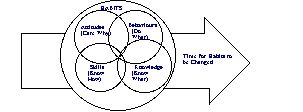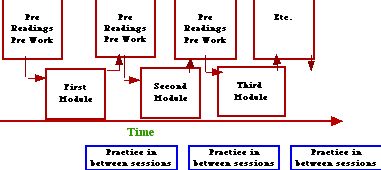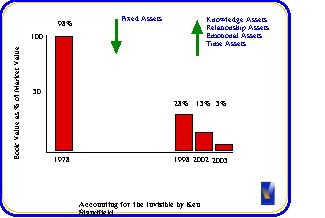
People Development Team Development
|
Strategically, the reason why teamwork is so important is because with teamwork your customers get a complete solution, without it they get a piecemeal solution. There is no alternative if you want to deliver an integrated complete solution to your customers, especially today when innovative ideas and fresh thinking are so vital and this can only come from cross-functional teams at every level. |
A MAJOR OPPORTUNITY! 80 percent of workers feel they are not using their strengths on a daily basis. Developing your team can release this energy and productivity!
The ultimate competitive advantage
Not finance. Not strategy. Not technology. It is teamwork that remains the ultimate competitive advantage, because it is so powerful and so rare. So why do so many teams - in business - full of talented people, richly resourced, fail to live up to their full potential? Why can't brilliant colleagues get along better? Why won't everyone row the boat in the same direction? If this sounds like your outfit, this product is for you!
Teamwork is not easy
For all the attention that it has received over the years from scholars, managers and consultants, teamwork is as elusive as it has ever been within most organisations. It's not easy to pull a group of diverse individuals together to work as a team, but there is no alternative if you want to deliver an integrated complete solution.
Many managers need help because teamwork isn't an intellectual process, it's an emotional process. There are many barriers to overcome. Some of these barriers include over-inflated egos, separation, silos, fierce territoriality, incentive systems that reward individual rather than collective achievement, and mistrust resulting from, acquisitions, mergers, or major internal restructuring.
This is not to say that teamwork is doome. Far from it. In fact, building a team is both possible and remarkably simple. The trick is to think of it as a process and to allow sufficient time for people to be able to change their habits.
Our Process
One-off processes almost always disappoint. A day or two out of the office on a team development course increases energy levels for a short time but it will not change behaviours. Our process is different, partly because it is a process (not a one-off intervention), it looks at teams as a strategic weapon and it provides sufficient time for changes in behaviours to occur. The steps in our process are:
- Build understanding and communications
- Build trust and
- Change habits and behaviours.
Delivery
We need to change habits and this takes time:

Changing habits takes time. We need time to change (in order of difficulty) attitudes, behaviours, skills and knowledge.
We have found that the best results are achieved by working with teams in short (3-4 hour) biweekly or monthly modules over a period of about 4 months. This produces lasting results without killing the budget and the participants.

The Modular Approach
The time in between modules is used to practice the knowledge and skills in real life situations so managers constantly reinforce new ways and practice new behaviours; taking it from theory to practice; reinforcing new ways and behaviours until they become new habits.
The Modules
The selection of modules will be determined by the group and in consultation with you, however they often include modules in the following mindsets...
Is this program for you?
This program appeals to managers who want to increase the performance of their team and who have the following qualities:
- Want things to be better;
- Believe their staff have the capability to achieve significantly more;
- Are prepared to invest time in a long term program of improvement;
- Realise that the existing way of tackling their problems has not created long term gains;
- Are open to new concepts.
A major opportunity
1. Intangibles now make up to 95% of the value of most organisations. Intangibles, including knowledge assets, relationship assets, emotional assets and time assets are all related to people.

2. Research shows that 5% of people in any organisation are natural leaders, 5% are "no hopers" and 90% can be influenced to swing one way or the other. If the 90% get proper development they will become more like the natural leaders and the organisation will win. If they are don't they will gravitate towards the "no hopers" and the organisation will lose. It is like a flask full of water, tilt it slightly one way and all the water will flood towards that direction (see the diagram below).

3. Research over the last 25 years has shown that 80 percent of workers feel they are not using their strengths on a daily basis (reported in "The 7 Hidden Reasons Employees Leave".
4. A few (only about 5% of the people), are extremely busy - sometimes frantically so. These are the Tops. They cope with the urgent, but keep putting off the truly important. The solution is to show managers how to release the untapped energy within the remaining 95% of their people (Middles and Bottoms) so they can start working on the business rather than in the business.
Your single most important investment
"If you are planning for one year, grow rice. If you are planning for 20 Years, grow trees. If you are planning for centuries, grow people.?' Chinese Proverb. Is this program for you"
Product support
This product has been developed and is supported by Bruce Holland with help where required from other members of the Virtual Group Business Consultants.
Guarantee
All work undertaken by Bruce Holland is guaranteed. If at the end of the program the client doesn't feel that they have received value for money, they may adjust the bill and pay an amount equal to the value they feel they received.
Next step
For more information about how you can use our Team Development Program give the Virtual Manager a call or ring Bruce Holland direct.
Bruce Holland
Phone +6421 620456
Bruce.holland@virtual.co.nz.
Key words: Leadership, leadership development, leadership management, leadership training, leadership program, leadership skills



